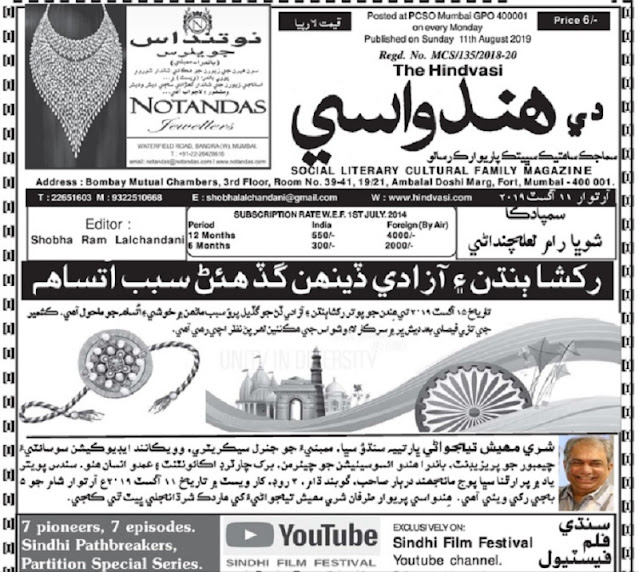Popati Hiranandani on Partition and Leaving Sindh
Popati Hiranandani's autobiograpy 'The Pages of My Life' unfolds the experiences of her personal life trapped in the geo-political debris of pre- and post-Partition India. She traces the agony and ecstasy of her life, the critical junctures of becoming and unbecoming in the life of a Sindhi woman-the two phases of her pre-Partition and post-Partition life are fused by the inconsolable and unmitigated trauma triggered by the loss of home.
Through an exegesis of gender relations in colonial and postcolonial India and scrutiny of personal experiences and memories, Hiranandani offers her understanding of the real obstacles that come in women's ways of wielding autonomy over their lives.
Hiranandani's short stories posit a fictional account of multifaceted existence of womanhood. Caught in the web of nostalgia, agony, pain of separation, and reunion-both imaginary and real-Hiranandani's protagonists attempt to veil their tears and recount the stories of the lives that remained untold and unheard for a long time.
Translated, and with an Introduction, by Jyoti Panjwani, this work traces the migration of the Sindhi community in pre- and post-Partition India. The detailed analysis of the development of Sindhi literature is accompanied by Panjwani's re-contextualizing of Hiranandani's life and work in present-day India.
Popti Hiranandani in her autobiography writes that there was an announcement on radio that India has been partitioned, newspaper headlines read that Sindh has become part of Pakistan, immigrants started to enter Sindh.
One day it was said that five thousand Mohajirs have entered Hyderabad, some of them were allotted the Muslim Hostel, some were brought to Salwat neighbourhood, and others in the maderssah. ‘Muslim Hostel was located at right side of our house,’ writes Popti.
There was fear and terror on every heart, mind and soul. Few young Muslims came out from hostel and chanted slogans to handover Heerabad to them, this terrorized the Hindu community. The Hindu girls were taught if a Muslim guy broke into the house put your fingers in electric sockets and press the button on.
Small pouches of poison were also stocked by Hindu families fearing if violence broke in the city that poison would help Hindu ladies to kill themselves. Police and military lorries patrolled in streets at evening and used to assure there won’t be any riots.
Hindus assumed that something wrong was going to happen. Popti trying to recall the intensity of that situation writes: ‘as I tried to switch on the radio, my mother stopped me saying: evil mongers would think we are having a jolly time here.’ She further mentions that two days later Hindu families crossed the border, leaving their motherland behind.
(An Abstract from Popati Hiranandani's Autobiography: The Pages of My Life)





Comments
Post a Comment